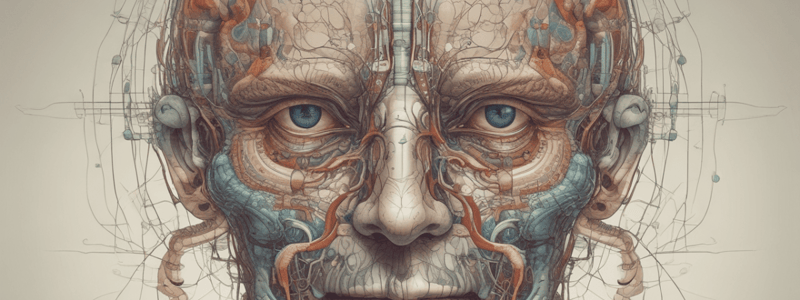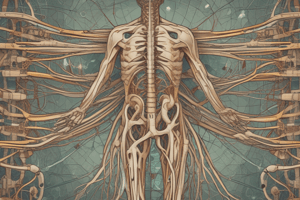Podcast
Questions and Answers
What is the primary function of the parasympathetic system?
What is the primary function of the parasympathetic system?
- To control urinary bladder emptying
- To increase heart rate and respiration during physical activity
- To regulate body temperature
- To conserve and store energy (correct)
Which of the following is NOT a function of the autonomic nervous system?
Which of the following is NOT a function of the autonomic nervous system?
- Cognitive functions (correct)
- Body temperature regulation
- Urinary bladder emptying
- Gastrointestinal motility
What is the origin of the parasympathetic preganglionic neurons?
What is the origin of the parasympathetic preganglionic neurons?
- Thoracolumbar system
- Craniosacral system (correct)
- Intermediolateral nucleus of segments T1 - L3
- Sacral spinal cord only
What is the role of the sympathetic system during stress?
What is the role of the sympathetic system during stress?
What is the name of the system that arises from cranial nerves and sacral spinal nerves?
What is the name of the system that arises from cranial nerves and sacral spinal nerves?
What is the target organ of the sympathetic system?
What is the target organ of the sympathetic system?
What is the purpose of the basal rates of the autonomic nervous system?
What is the purpose of the basal rates of the autonomic nervous system?
What is the origin of the sympathetic preganglionic neurons?
What is the origin of the sympathetic preganglionic neurons?
What is the primary difference between the sympathetic and parasympathetic systems?
What is the primary difference between the sympathetic and parasympathetic systems?
What type of axons do postganglionic neurons have?
What type of axons do postganglionic neurons have?
What is the main function of postganglionic neurons in relation to target tissue?
What is the main function of postganglionic neurons in relation to target tissue?
What is the name of the neurotransmitter released by parasympathetic neurons?
What is the name of the neurotransmitter released by parasympathetic neurons?
What is unique about the structure of postganglionic neurons?
What is unique about the structure of postganglionic neurons?
What is the exception to the sympathetic neurons releasing norepinephrine?
What is the exception to the sympathetic neurons releasing norepinephrine?
What is the term for the ability of the sympathetic system to respond to physical or emotional stress?
What is the term for the ability of the sympathetic system to respond to physical or emotional stress?
What type of muscle is innervated by postganglionic neurons?
What type of muscle is innervated by postganglionic neurons?
What is the neurotransmitter released by sympathetic neurons that synapse with glands?
What is the neurotransmitter released by sympathetic neurons that synapse with glands?
Which zone of the adrenal cortex produces mineralcorticoids?
Which zone of the adrenal cortex produces mineralcorticoids?
What is the term for the sympathetic neurons that release norepinephrine?
What is the term for the sympathetic neurons that release norepinephrine?
What is the primary function of the Parasympathetic Tone?
What is the primary function of the Parasympathetic Tone?
Which hormone is produced by the Zona Reticularis?
Which hormone is produced by the Zona Reticularis?
What is the effect of the massive coordinated output on heart rate?
What is the effect of the massive coordinated output on heart rate?
Which type of hormone does the adrenal cortex produce?
Which type of hormone does the adrenal cortex produce?
What is the effect of ALPHA receptors on arterioles of visceral organs?
What is the effect of ALPHA receptors on arterioles of visceral organs?
What is the origin of the Adrenal Medulla?
What is the origin of the Adrenal Medulla?
What is the origin of the adrenal glands?
What is the origin of the adrenal glands?
What is the effect of the Parasympathetic Tone on heart rate and contraction force?
What is the effect of the Parasympathetic Tone on heart rate and contraction force?
Which of the following is NOT a short-term effect of the massive coordinated output?
Which of the following is NOT a short-term effect of the massive coordinated output?
What is the function of catecholamines in the stress response?
What is the function of catecholamines in the stress response?
What is the effect of the massive coordinated output on blood glucose and free fatty acids concentration?
What is the effect of the massive coordinated output on blood glucose and free fatty acids concentration?
Which hormone is produced by the Zona Fasciculata?
Which hormone is produced by the Zona Fasciculata?
What is the effect of the Parasympathetic Tone on intestinal motility?
What is the effect of the Parasympathetic Tone on intestinal motility?
Which of the following organs is NOT affected by the sympathetic nervous system?
Which of the following organs is NOT affected by the sympathetic nervous system?
What is the effect of the massive coordinated output on arousal state?
What is the effect of the massive coordinated output on arousal state?
Which of the following is a characteristic of the adrenal glands?
Which of the following is a characteristic of the adrenal glands?
What is the effect of ALPHA 2 on insulin secretion?
What is the effect of ALPHA 2 on insulin secretion?
What is the function of BETA 1 receptors in the heart?
What is the function of BETA 1 receptors in the heart?
What is the role of baroreceptors in the internal carotid artery and aorta?
What is the role of baroreceptors in the internal carotid artery and aorta?
What is the effect of BETA 2 receptors on skeletal muscle?
What is the effect of BETA 2 receptors on skeletal muscle?
What is the effect of BETA 3 receptors on adipose tissue?
What is the effect of BETA 3 receptors on adipose tissue?
What is the role of the medulla oblongata in the control of blood pressure?
What is the role of the medulla oblongata in the control of blood pressure?
What is the effect of ALPHA 2 receptors on glucagon release?
What is the effect of ALPHA 2 receptors on glucagon release?
What is the function of stretch receptors in the internal carotid artery and aorta?
What is the function of stretch receptors in the internal carotid artery and aorta?
What is the effect of BETA 2 receptors on the airways?
What is the effect of BETA 2 receptors on the airways?
Match the definition/description to the corresponding receptors.
Match the definition/description to the corresponding receptors.
Acetylcholine is synthesized in the terminal endings and varicosities of _____________ fibers.
Acetylcholine is synthesized in the terminal endings and varicosities of _____________ fibers.
Norepinephrine is synthesized in the ________ of terminal endings and at ___________ vesicles. _________ is produced in the process to making norepinephrine.
Norepinephrine is synthesized in the ________ of terminal endings and at ___________ vesicles. _________ is produced in the process to making norepinephrine.
In postsynaptic receptors, neurotransmitters will bind to ___________ or ________ receptors at the postsynaptic neuron. This causes a change in cell membrane _________ to one or more ions.
In postsynaptic receptors, neurotransmitters will bind to ___________ or ________ receptors at the postsynaptic neuron. This causes a change in cell membrane _________ to one or more ions.
Nicotinic receptors are metabotropic receptors, and Muscarinic receptors are ionotropic receptors
Nicotinic receptors are metabotropic receptors, and Muscarinic receptors are ionotropic receptors
Both adrenergic receptors and dopaminergic receptors are metabotropic receptors.
Both adrenergic receptors and dopaminergic receptors are metabotropic receptors.
List the nicotinic receptor subtypes.
List the nicotinic receptor subtypes.
What effect does acetylcholine binding to nicotinic receptors have on postganglionic neurons?
What effect does acetylcholine binding to nicotinic receptors have on postganglionic neurons?
Where are muscarinic receptors primarily located?
Where are muscarinic receptors primarily located?
What differentiates muscarinic receptors in terms of response to acetylcholine?
What differentiates muscarinic receptors in terms of response to acetylcholine?
What happens when acetylcholine is released from parasympathetic postganglionic neurons?
What happens when acetylcholine is released from parasympathetic postganglionic neurons?
What role do G proteins play in muscarinic receptors?
What role do G proteins play in muscarinic receptors?
Study Notes
Autonomic Nervous System
- Controls visceral functions and glandular secretions
- Regulates various bodily functions, including:
- Atrial pressure
- Gastrointestinal motility and secretion
- Urinary bladder emptying
- Body temperature
Parasympathetic System
- Responsible for processes that conserve and store energy
- Involved in day-to-day control of basic visceral functions
- Functions include:
- Breathing at rest
- Digestion
- Elimination of waste
- Arises from cranial nerves and sacral spinal nerves
- Craniosacral system consists of preganglionic neurons located in the brainstem and sacral spinal cord
Sympathetic System
- Target organs include:
- Sweat glands
- Piloerector muscles
- Blood vessels
- Functions when the animal is stressed
- Enables vigorous physical activity with rapid production of energy
- Increases heart rate, respiration, and changes blood flow to activate muscles and dilate pupils
- Thoracolumbar system consists of sympathetic preganglionic neurons from the intermediolateral nucleus of segments T1-L3
Postganglionic Neurons
- Have slow conducting unmyelinated axons (C fibers)
- Innervate smooth muscle, cardiac muscle, and glandular tissue
- Can excite or inhibit target tissue
- Have varicosities distributed along the length of branches
Neurotransmitters
- Parasympathetic system: cholinergic, releasing acetylcholine
- Sympathetic system: adrenergic, releasing norepinephrine
- Exceptions:
- Synapse with glands: cholinergic
- Synapse with renal vessels: dopaminergic
Sympathetic Tone
- Under physical or emotional stress, the sympathetic system is capable of massive coordinated output with widespread effects
- Increases heart rate and blood pressure
- Pupil dilation
- Elevation of blood glucose and free fatty acids concentration
- Increased arousal state
Adrenal Gland
- Adrenal Cortex:
- Mesoderm origin
- Steroid hormones
- 3 layers: zona glomerulosa, zona fasciculata, and zona reticularis
- Adrenal Medulla:
- Ectodermal origin
- Postganglionic neurons of SNS
- Secretes catecholamines: epinephrine and norepinephrine
Stress Response
- Massive discharge of catecholamines
- Increases the body's ability to perform vigorous activity
- ALPHA receptors: contraction of arteriolar smooth muscle, increasing blood pressure
- BETA receptors: increase heart rate and force of contraction, increase renin release, and vasodilation of skeletal muscle
Autonomic Reflexes
- Homeostatic reflexes
- Control blood pressure
- Important in maintaining sufficient brain blood flow
- Stretch receptors in the internal carotid artery and aorta detect systemic blood pressure
- Baroreceptor to measure blood pressure
- Afferent neuron carries information to the medulla oblongata
- Brainstem centers (medulla) process the information and coordinate an appropriate response
- Efferent neurons direct changes in the heart and blood vessels
Cholinergic Receptors
- Acetylcholine (ACh) interacts with two types of cholinergic receptors: nicotinic and muscarinic.
Nicotinic Receptors
- Located on the cell bodies of all postganglionic neurons in both sympathetic and parasympathetic branches of the autonomic nervous system (ANS).
- ACh released from preganglionic neurons binds to nicotinic receptors, leading to rapid cellular permeability changes to Na+ and Ca++ ions.
- The influx of Na+ and Ca++ ions results in depolarization and excitation of postganglionic neurons in ANS pathways.
Muscarinic Receptors
- Found on the cell membranes of effector tissues and linked to G proteins and second messenger systems for intracellular signaling.
- ACh released from parasympathetic postganglionic neurons and some sympathetic postganglionic neurons (such as those innervating sweat glands) binds to muscarinic receptors.
- The effect of muscarinic receptors can be either inhibitory or excitatory, depending on the tissue type.
Studying That Suits You
Use AI to generate personalized quizzes and flashcards to suit your learning preferences.
Related Documents
Description
This quiz covers the autonomic nervous system's control over various visceral functions and glandular secretions, including atrial pressure, gastrointestinal motility and secretion, urinary bladder emptying, and body temperature regulation.




